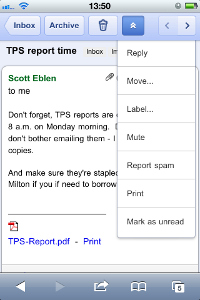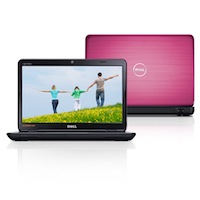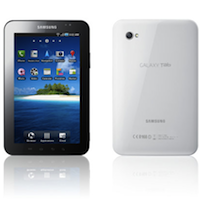
Your phone number can now become your Google Voice number
Google on Tuesday announced that existing Google Voice users can port their phone numbers over to the Google Voice service for a one-time fee of $20. Previously, users could only be assigned new numbers for the service, and not bring their existing number with them like they can between telephone companies.
"One of the most frequent requests we hear from people who use (or want to use) Google Voice is that they'd like to get all of Google Voice's features without having to give up their long-time phone numbers," said Google Software Engineer Robert Dong in the Google Voice blog today.

11 free tools for automating repetitive tasks in Windows
Anyone who's performed the same mindless task more than a dozen times will know the benefits of finding some tool to do the job for you. After all, why take five minutes to perform a set of repetitive commands when you might be able to press a single button, sit back and watch the task whizz by? In this feature we've dug out 11 free tools that are designed to do the hard work for Windows users, so you don't have to.
The tools in question cover a variety of different repetitive tasks: convert and edit a group of images, add AutoText to any application, rename a large group of files quickly, or create powerful scripts that automate processes and tasks across multiple programs and even Windows itself. There's a tool here for everyone, so sit back, press a button, and let your computer take the strain -- after all, that was one of the reasons you bought it in the first place.

Why is iPad successful?
It's the question asked by a Betanews reader last week. While there is no single answer, two reasons stand out: iPod and iPhone and the ecosystem supporting them. Apple launched its tablet with huge manufacturing, distribution and third-party support, something it didn't have with iPod and less of with iPhone. Purely from that perspective, and discounting design or technical merits, Research in Motion and Samsung are strategically in best competitive ecosystem positions to release viable iPad competitors.
Some Apple fans will disagree, arguing that iPad's size, design and user experience make it far superior to other tablets. I won't debate those points here but only observe they would be meaningless without the supporting ecosystem created by iPod and iPhone. Apple didn't launch iPad into a vacuum but with lush sales and distribution environment.

Yet again, comScore says Yahoo's sites had more unique views than Google's
Web metrics company comScore on Monday announced its Media Metrix Top 50 U.S. Web properties for the month of December, an important time to watch web traffic due to the holiday-related shopping that takes place. Once again, comScore ranked Yahoo and its related sites as the top Web property with 182 million unique viewers, beating out Google's 179.3 million and Microsoft's 177 million.
Amazon saw a spike in traffic in December that drove it up to the #7 position, and weather-related sites The Weather Channel and WeatherBug both enjoyed big spikes in unique visits due to holiday-related travel planning.

Nitro PDF Reader 1.4 adds intelligent hyperlink recognition
Nitro PDF Software has released version 1.4 of their PDF Reader, a small but worthwhile update that contains a number of useful time-saving features. Top of the list is the new intelligent hyperlink recognition, a simple but welcome addition that should help you to bypass a common PDF annoyance.
You've seen it many times: your PDF document includes a URL, but it's in plain text, and therefore clicking it has precisely no effect at all, which is irritating. Nitro PDF Reader actually scans the document ahead of time and converts plain text web addresses into active links, though, so there's no need to manually open a browser window and paste the address -- you can simply click the URL to open a site, as the author intended.

Gartner: Most CIOs have their heads in the clouds
What do CIOs care most about? Cloud computing, says Gartner. They see the cloud as opportunity to freeing up resources that will be reinvested in future growth. Gartner released the findings of its 2011 CIO Agenda survey on Friday.
According to Gartner, the typical IT organization invests two-thirds of its budget to daily operations. Moving to the cloud will fee up between 35 percent to a whopping 50 percent of operational and infrastructure resources for reallocation elsewhere.

VLC Media Player 1.1.6 update released
VideoLan.org has released a minor update to its video playback tool,VLC Media Player. VLC 1.1.6 is a minor release that contains a few minor new features, plus consists mainly of bug fixes and security improvements.
VLC Media Player is both cross-platform and open-source, and is capable of playing a wide variety of video and audio formats without the need for additional codecs or downloads. It can also be used for playing back DVD movies -- a capability that first made it popular with Windows XP users (XP has no built-in capabilities for playing DVDs). Version 1.1.6 comes two months after version 1.1.5 was released last year -- over 58 million downloads of the last version have been recorded by VideoLan.org.

Grappler grabs online video for Macs
The web is chock-a-block with video: YouTube, streaming video, downloadable movies -- the list is endless. Unfortunately, most of it is tied to the Internet: you have to be online to access it and watch it through your web browser, which isn't always the most convenient way of doing things.
Grappler promises to change all that for Mac users. This shareware tool is unbelievably simple to use: once installed, you have two choices: if you know the URL, enter it to visit the web site directly, then click on the video -- Grappler will detect it and start downloading. If you don't have a web site in mind, enter your search terms to reveal a list of possible matches, then scroll through the results that Grappler finds on the web. You can view a video direct from within Grappler, visit the parent website it's taken from and -- most importantly -- download it to your Mac for viewing offline.

How to wirelessly print photos from Android with new Gmail Cloud Print
Monday, Google announced it will be rolling out its "Cloud Print" mobile Gmail feature over the next few days to U.S. users. Cloud Print lets users pair their Google ID with various printers, and then send print jobs from anywhere the user has a connection.
In mobile Gmail's options menu, there is now a button simply marked "print" which lets the user send a print job to his Cloud Print tray from his Android or iOS mobile device. From here, the user can select the destination printer and begin printing the contents of selected emails, and .pdf or .doc attachments. This is an incredibly useful feature, as it eliminates the need for printer drivers for mobile devices.

Firefox, Chrome to gain 'do not track' functionality
Browser manufacturers are heeding the Federal Trade Commission's proposal in December of last year to create a 'do not track' system, with both Google and Mozilla saying they plan to add the functionality in coming versions of their respective browsers.
Microsoft was actually first to officially announce support for the feature last month. The Redmond company said at the time it would appear in Internet Explorer 9, and allow users to opt out of sharing information with sites they do not trust. Users would be able to create whitelists and blacklists for sharing browser data.

Flash is no longer default option for YouTube embeds
I don't know how I missed this one: Google has taken iframe embedding out of beta and quietly made it the default choice. I noticed yesterday, when looking to embed a video here at Betanews. The default had been Adobe Flash with iframe embedding optional and labeled beta; where iframe was placed in the embed options there now is "use old embed code," meaning Flash. I've been embedding with the iframe code for months so Betanews readers using iPads or smartphones could watch embedded YouTube videos. Based on forum chatter, Google made the change as recently as four days ago.
Technically, the player isn't Flash-free. It's more like Flash is no longer required. Videos can stream in Flash or HTML5 video depending on the player detected. For reasons that don't make much sense from a consumer experience perspective, YouTube videos using the new embed code won't play on Safari without Flash installed (presumably other browsers, but I haven't yet tested). YouTube detects the browser and presents notice that Flash is necessary to play the video. It's not. YouTube is blocking HTML5 streamed content. Changing the browser's identification to "Mobile Safari -- iPad" solves the problem. But why is that necessary?

Huawei accuses Motorola of trying to sell its secrets to Nokia-Siemens
Chinese telecommunications company Huawei filed a lawsuit against Motorola on Monday alleging misappropriation of trade secrets, copyright infringement, and breach of contract related to Motorola's $1.2 billion wireless infrastructure deal with Nokia Siemens Networks.
In July, Motorola agreed to sell its GSM and CDMA wireless infrastructure business to Nokia Siemens for $1.2 billion, a deal which promised to vastly improve Motorola's cash situation as it moved toward the completion of its split into two companies.

Refurbished PCs: When used is better than new
Whenever possible, I buy refurbished PCs rather than new ones-- and it's what I recommend to all my friends. Unfortunately, the word "refurbished" is loaded with bad connotations -- used, damaged, unreliable -- that can make items so labeled unattractive to many buyers. But it's my experience that at least with personal computers, refurbished often means better than new, because retailers or manufacturers are selling something at a loss they never want to see again. Returned once is one time too many. Twice or thrice is simply unacceptable.
I got my first tip off about the benefits of refurbished in the late 1990s when visiting a Sony repair store then located in Beltsville, Md. I observed a number of PCs and asked about them. One of the clerks explained that the shop was one of just a couple clearinghouses refurbishing Sony PCs. I expressed my disbelief in refurbished as being any good. But he explained that Sony didn't want to ever see the PCs again. His job was to make sure the refurbished PCs left in perfect working order.

Is 7-inches the better size for a media tablet?
It's the question I've been asking since selling my iPad the week before Christmas. I simply found the tablet to be too large to regularly carry about. I wasn't using it. I ask you to answer the question in comments or by email -- to joewilcox at gmail dot com. I'm particularly interested in hearing from people who have used, say, iPad and Samsung Galaxy Tab.
Late Friday, Kevin Tofel turned up the volume on the topic with GigaOM/jkOntheRun post "Why I Dumped the iPad (Hint: Size Matters)." While praising iPad's many benefits, Tofel reached the same place as I did. "The problem is that I simply don't use it any more," he writes. "Actually, let me rephrase that: I stopped using the iPad about a month ago, after I bought a 7-inch Samsung Galaxy Tab running Google Android."

LastPass extends support to Opera and Windows 7 phones
LastPass 1.72 now supports the Opera web browser in addition to Internet Explorer, Firefox, Chrome and Safari. Premium account holders can also now download LastPass to their Windows 7 phone in addition to other mobile platforms. Other premium-only new features include support for fingerprint and smart card authentication devices.
LastPass 1.72 has also been tweaked in other areas, most notably in terms of improving both its stability and performance in Internet Explorer 9. It also handles multiple Google logins where just a password is required better, and can also save usernames by default on banking websites where passwords are split over multiple pages.



